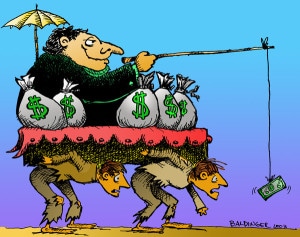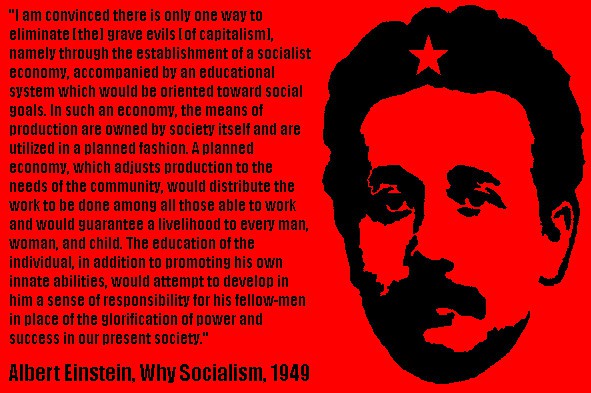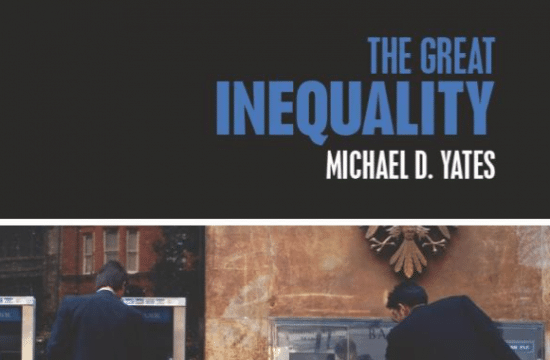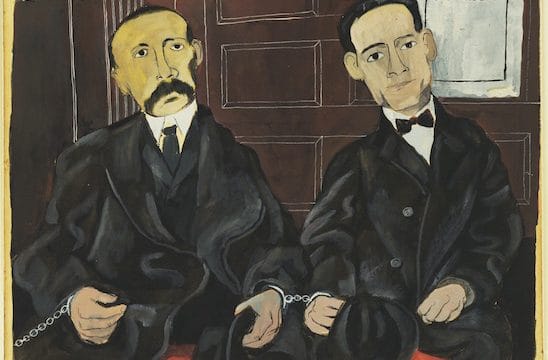 When the great populist Huey Long was campaigning for governor of Louisiana, he wrote some clever slogans and songs. One song began: “Every man a king, for you can be a millionaire.” Back then, in the late 1920s and early 1930s, the word “millionaire” meant that a person was rich beyond the dreams of mere mortals. Long used it to suggest that everyone could and should be rich, that there was plenty to go around in such a wealthy country. He favored equality and democracy. In a slogan, he said, “Every man a king, but no one wears a crown.”
When the great populist Huey Long was campaigning for governor of Louisiana, he wrote some clever slogans and songs. One song began: “Every man a king, for you can be a millionaire.” Back then, in the late 1920s and early 1930s, the word “millionaire” meant that a person was rich beyond the dreams of mere mortals. Long used it to suggest that everyone could and should be rich, that there was plenty to go around in such a wealthy country. He favored equality and democracy. In a slogan, he said, “Every man a king, but no one wears a crown.”
Huey Long had faults, but he wasn’t in favor of the dog-eat-dog world that is the contemporary United States. Today, the people who say “you can be a millionaire” are the hucksters on television infomercials, hyping their “get rich” seminars, or the talking heads on Fox who declaim that we can all be rich (like they are) if we only work hard enough and have the proper amount of perseverance (like they did). If you want it bad enough, it will be yours, they tell us.
The United States is chock full of rich folks. We admire them immensely and wish we were like them. However, I think sometimes that we are still thinking in terms of Huey Long’s use of the word “millionaire.” We haven’t realized that a million dollars isn’t what it used to be. Nowadays, we have billionaires, quite a few of them. The infamous “Forbes 400,” a list of the 400 richest persons in the United States, had a minimum qualifying net wealth (assets minus liabilities) of $950, 000, 000 in 2009, which means that there were nearly 400 billionaires in the United States. The average net worth of the “400” was $3.2 billion and the maximum was $50 billion.
A billion dollars is equal to 1,000 million dollars, so 400 billionaires is the equivalent of 400,000 millionaires. Suppose the a person with a billion dollars spends $10,000 every day and receives no interest on his money. Dividing one billion by 10,000 give us 274 years. That is nearly four, seventy-year lifetimes!
Net wealth is what a person is worth, in terms of money, at a particular point in time (in the United States, at least as far as the dominant culture is concerned, I probably could have skipped the phrase, “in terms of money”). Income, on the other hand, is money (or sometimes goods and services such as room and board, food stamps, use of a corporate jet, energy subsidies, and the like) that comes our way over some period of time. Common types of income are wages, rents, interest, dividends, profits of unincorporated businesses, social security, and capital gains. The time period we usually consider is one year. So I say that I was paid a certain number of dollars for my work as an editor in 2011. Or my social security income was so many dollars last year. My total 2011 income is the sum of all the money I took in that year.
A billion dollars in wealth is one thing. A billion dollars in income is almost inconceivable. Yet, in recent years, some persons have made billion dollar incomes. It is possible that a few could get a billion or more just from interest on their wealth. Bill Gates once had an estimated fortune of close to one hundred billion dollars. Suppose that he was able to get a rate of return on the assets represented by this wealth of just 2 percent. This would yield a yearly income of two billion dollars.
While using google to find information for this post, I came upon a New York Times article about the pay of hedge fund managers in 2009. The title is “Pay of Hedge Fund Managers Roared Back Last Year.” The Great Recession that began in December 2007 put a crimp in the style of the super rich as stock prices fell and the value of all the exotic financial instruments that these same people bought and sold imploded. But thanks in large part to the generosity of the Obama administration, those at the pinnacle of the income pyramid rebounded and are nearly as rich as ever. At the top of the hedge fund entrepreneurs was David Tepper of Pittsburgh. He used money in his hedge fund to make a large bet that the banks would be bailed out by the government and be saved from insolvency. His reward was a payment from his hedge fund to himself—managers of these funds typically receive a management fee plus a share of any gain in the fund’s assets—of four billion dollars in 2009. Noted financier and, according to Fox News, raving communist, George Soros was second to Tepper, with an income of $3.2 billion. Remember, this is income, not wealth. Tepper and Soros made these outsized sums in one year.
Suppose Tepper and his heirs spend $10,000 a day and again assume no interest on the $4 billion. It would take 1,096 years to spend one year’s income. If they spend $100,000 a day, the income would last nearly 110 years.
Naturally, the super rich do not spend all their money. They save and use the saving to buy society’s productive resources—the capital that the rest of us rely on, by selling our ability to work to its owners. Then, with the power ownership gives them, they take from us the labor time that generates business profit. The profit not only increases their incomes and wealth, it also secures the power that allows them to do this in the first place. Money and its corresponding economic power support enormous and complex structures of political, social, and cultural power that maintain the entire exploitative system.
At the other end of the tremendous economic divide that characterizes the United States are the super poor. In 2010, more than 7,000,000 people had incomes less than 50 percent of the official poverty level of income, an amount equal to $11,245. It would take 355,713 years of receiving this income to equal Tepper’s four billion. To ask how much power those at the bottom have is to answer the question.
Any thoughtful person must know that the inequality that marks the United States stacks the deck in favor of those who have the most income and wealth. But the key to ending this inequality is not redistributing some of this from the rich to the poor. It is instead bringing to an end the entire power structure that makes capitalism tick and whose existence guarantees the continued subservience of most people to the wishes of the few. Because in capitalism, it is the poverty of the majority (of workers) that gives rise to the riches of the minority (of capitalists), and the reverse is just as true.








Mike writes:
“Any thoughtful person must know that the inequality that marks the United States stacks the deck in favor of those who have the most income and wealth. But the key to ending this inequality is not redistributing some of this from the rich to the poor. It is instead bringing to an end the entire power structure that makes capitalism tick and whose existence guarantees the continued subservience of most people to the wishes of the few.”
A concern with redistributing income from the rich to the poor was a defining characteristic of at least old-style social democracy (the sort that existed prior to the rise of “third way” varieties of social democracy which are really just varieties of neo-liberalism “with a human face.” But as Mike suggests, that sort of reformism is ultimately inadequate, primarily because as long as capitalism exists, capital will not only be resistant to any reforms that encroach upon its profits but also because capitalists will, when it seems opportune, seek to roll back past gains made by the working class. The US seemed to experience a social democratic break through, starting with the New Deal in the 1930s, and continuing on through the Great Society of the 1960s. And yet for the past thirty years, there has been a concerted effort on the part of capital to roll back many of the gains that had been made in that period. Starting with the economic crisis of the mid-1970s, when capital had been been experiencing erosion of profit rates, big business has sought to recoup these losses by cutting back social programs and weakening, if not outright destroying labor unions. Not to speak of the closing of closure of manufacturing plants and business offices in the US and the off-shoring of production overseas. The current economic crisis, starting in 2008, has led to an intensification of all these efforts, which have had the support of both major political parties in the US.
Likewise, the same sorts of things can be seen going on in western Europe, where social democratic reformism had long enjoyed greater success than in the US. Even the Scandinavian countries, including Sweden, where social democracy had seemed to push to the limit of what was possible under capitalism, has been seeing rollbacks in the social safety net. Other European countries, especially those in southern Europe (i.e. Greece, Italy) have been faring even worse. In both Italy and Greece, elected governments have been replaced with governments of technocrats (read governments of bankers) that have dedicated themselves with slashing social spending. What seems to be clear, is that under capitalism, even when social democratic reformism seems successful, this sort of success turns out to be temporary.
Jim, Thanks for the thoughtful post. I have been reading a book, Inequality and Power, The Economics of Class, by Eric A. Schutz, which has a great discussion of how inequality is intimately connected to the power relationship between workers and employers. Nothing new to Marxists but the way he lays this out is pretty good. And he begins with the neoclassical economists’ occupation choice theory. He moves very cleverly from this to an examination of class power. Hopefully, by bringing the issue of inequality to the forefront of US politics, the OWS uprising will help generate movements that push us toward a radical understanding of what gives rise to the inequality.
Sheldon, I was asked to review this book for Monthly Review and was appalled at the price tag. I got a review copy through MR. I don’t think anyone realized how expensive it is. If you send me a mailing address (send it to mikedjyates@msn.com), I will send you my copy after I finish my article.
Thanks for your post that puts all this in perspective. I just went to Amazon to see about that book you mention above. Its $100 bucks! $90 delivered to my Kindle! I guess I won’t read it.
first visit
great blog
i like the walking speed of it all
i tend to jet and flit about like a wasp
stay long enough to sting maybe
u miss the guts of stuff that way
lester thurow long since moved on to bigger things
many years ago mid 70’s published a book
he titled
“generating inequality ”
that two word phrase
tends to rings in my head all the time
it gets at the structural mission so to speak
of our corporate fashioned and tended
market and work place institutions
just found this:
” I asked Paul what he thought of the economic ideas of William Vickrey, a liberal economist who had just won the Nobel Economics Prize and who had worked for the Roosevelt administration during the New Deal, as had Paul. Sweezy allowed that Vickrey was a good man, but the advances in economics for which he had won the Prize were “trivial.”
vickrey had a final phase quite along different lines
perhaps you are familiar with it
here is a little stem winder from his final days
http://www.columbia.edu/dlc/wp/econ/vickrey.html
hyper fiscal thrust hyper employment
yes posed in the keynes tradition and with keynes categories
but a challenge to the system
that would crack it to pieces
quixotic bill never saw this of course
but to suggest as PS does
that his prize work was trivial
though true more or less
may not take this not prized late period work
into consideration
his white hot job market
“anyone get a market generated job in two days search”
is a practical option any time we want to gun up the transfer system outflow and holliday the jopb class portions
of the federal state and local tax system
but despite this evident option
with all its obvious advantages
it must remain a systemic taboo
such a demand tasks the system
far more then these silly notions
of a public sector” come one come all ”
jobs on demand just go see uncle
why that amounts to a liberal gulag
Paine, thanks for visiting and for the kind words. I read the Vickrey piece. Paul was a bit too sharp I think. At the time, he was old, and while not yet ill, still feeling cranky. Didn’t enjoy food much, etc. Not too old though not to flirt with pretty women!
Vickrey is hard-hitting in this essay. Heaps scorn on all the foolish notions of the neoclassical true believers. He hits home today with all the nonsense about austerity. Demands that task the system are radical and must be made. Our good liberals won’t ever make them, however. Which is why I get crazy when I see certain leftists singing the praises of a dog like Jeffrey Sachs. Anyway, I thought it was particularly sad when Vickrey died just as he was on such a fine roll.
Great piece! I’m sharing it on my Facebook page. The focus you put on the social relation of Capital is spot on. Jim makes some excellent points about social democratic reform too.
One observation which I think useful is to point out how the money commodity has inflated since Huey’s day. He was governor of La during the latter part of the ‘roaring 20s’ and assassinated after the last Great Depression began, in ’32. The 20s saw a great, largely unnoticed bubble in asset prices expand to bursting point in ’29. I always like to remember that the US Gov had an ounce of gold pegged at $16 an ounce until 1933 when FDR changed it to $32 an ounce. The USD had inflated since the ‘gold standard’ had been set by the USG in the 19th century and the bubble had to be lanced. After all, a commodity, even money. maybe even especially money, can’t have a price way above its value (socially necessary labour time) for too long before it comes to be noticed within the social relations of Capital.
I guess the point of all this is to say that a million bucks in Huey’s day were unacknowledged inflated bucks. The buck today is 100 time more inflated than it was during the days of the ‘gold standard’…something over $1,600 an ounce last I checked. A million bucks in the 20s was actually closer to 100 million bucks in today’s USD terms.
Mike, as always, astute comments. Today, with gold produced with such advanced technology, not too much direct labor is needed. I wonder if there will be a crash in gold prices. What do you think?